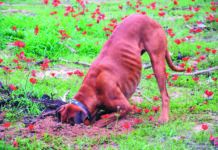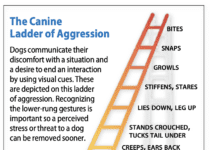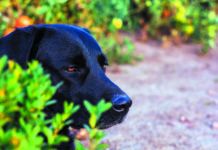We’ve devoted a fair amount of space in Your Dog to explaining that dogs experience the world differently than we do because of differences in their senses of sight, hearing, smell, and so on. But, it turns out, dogs are busy assessing how we experience our world, too — and using it to their advantage to gain access to resources. Researcher Juliane Kaminiski of the United Kingdom’s University of Portsmouth made the discovery when she observed whether dogs took food they were firmly forbidden to eat.
In an experiment involving some two dozen dogs of various breeds, she placed food on the floor of a room whose windows had been covered to block out all light. Each dog was then brought into the room without any of the other dogs present, and in a strong, low-pitched voice, Dr. Kaminski instructed every one of them not to take any of the kibble. Immediately afterward, she turned off the lights so that the room was pitch black but, at intervals, shed light on the food, on herself, on both herself and the food, or neither.
She figured each dog would be most likely to take the food when she herself was in total darkness, thus removing what she calls the “aversive stimulus” — the person who said not to eat the food. But as it turned out, the dogs were most likely to take the food when the food itself was not illuminated. That is, the dogs appeared to understand that when the food couldn’t be seen by her, they had their best chance of “getting away with” taking it. Whether her face was visible had less to do with it.
Moreover, dogs who were apt to take the food whether or not light shone on it tended to go for it much, much faster when the food was in darkness. There was no hesitation, presumably because they felt they wouldn’t get in trouble for disobeying a command if the person who had made the command couldn’t see them taking matters into their own paws.
This is not the first piece of research to suggest that dogs know when human vision is blocked—and use that knowledge to outsmart their guardians. For instance, a previous experiment showed that dogs steal more food when the dogs are hidden from view by a large barrier compared to a small one.
Other species are also aware that light, or the absence of it, affects the behavior of creatures unlike themselves. In a study of jays, the birds stored their food in the shade only when they were being observed. When they were not being watched, they were just as likely to store their food in areas that were well lit. There was clearly a recognition among the birds that the intensity of light affected the behavior of “competitors” for that food even when those competitors belonged to other species.
“We are not sure yet how flexible” dogs are when it comes to understanding the sensory perceptions of other animals, including humans, Dr. Kaminski says. “There will be a lot more research looking into this.” But it may be that if dogs could put out a newsletter, they’d call it Your Human and write articles reminding each other to hide their food in dark spots for times when the human in the house decides they shouldn’t be eating.




